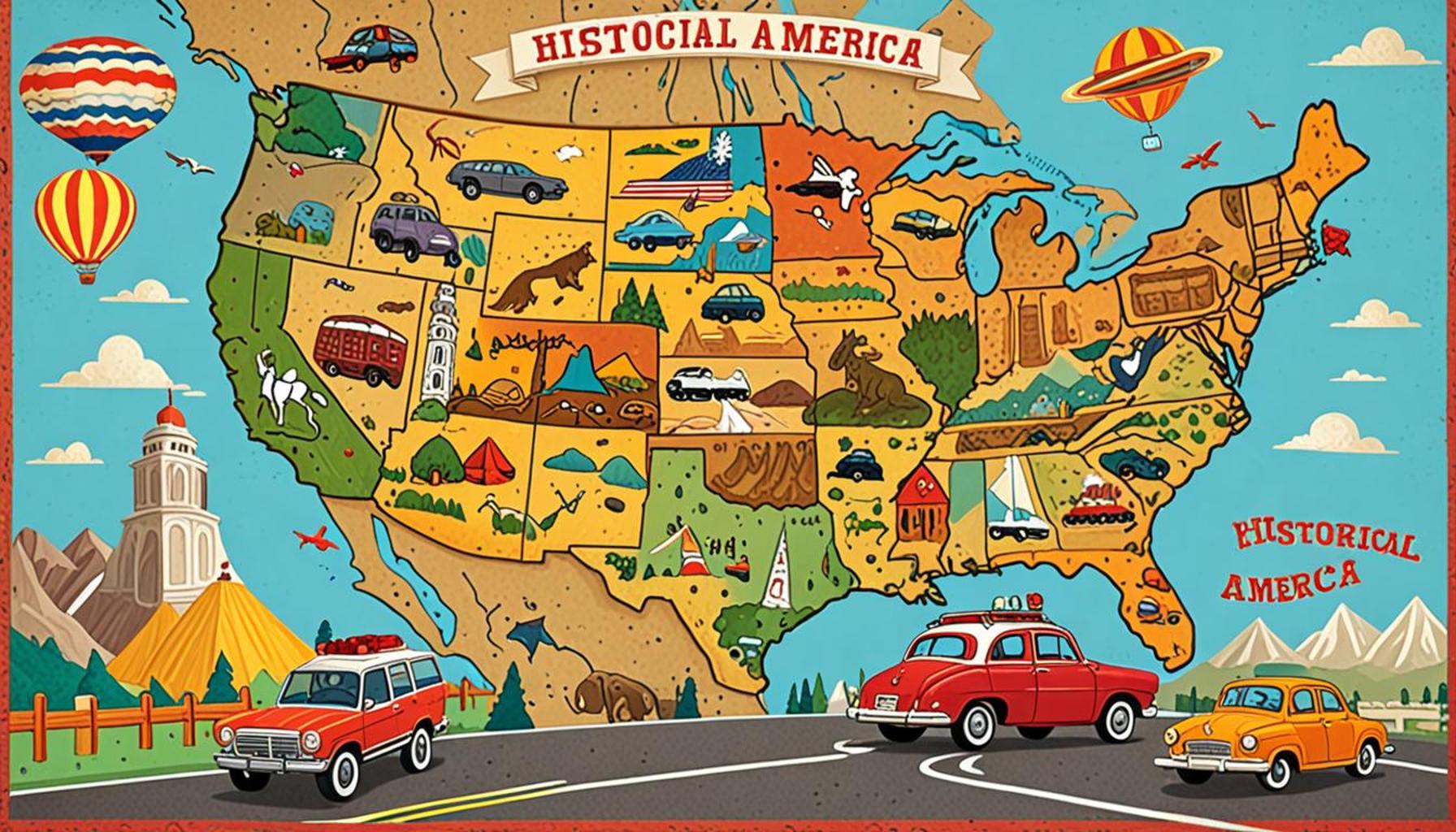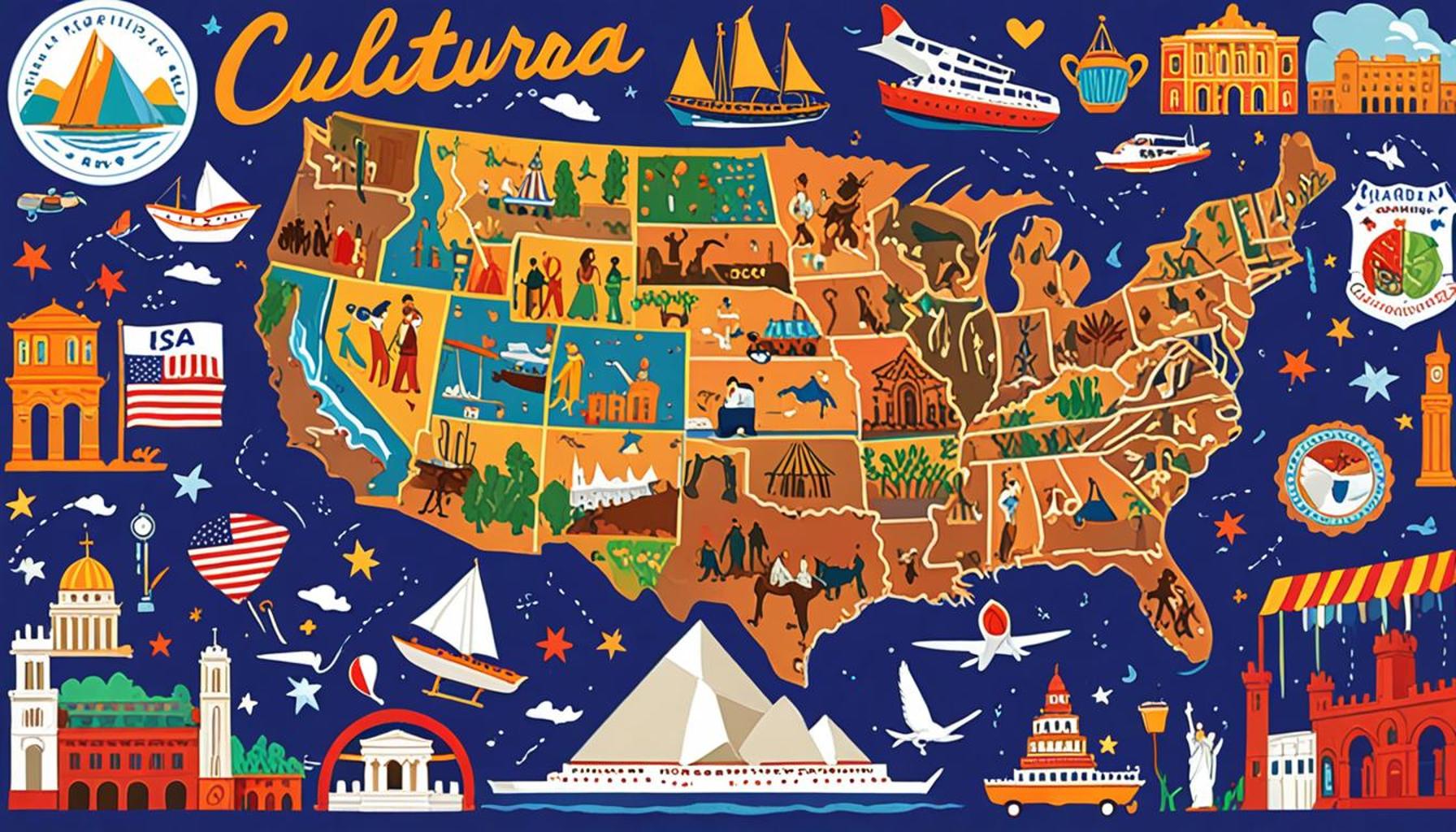Historical Road Trips: Discovering America’s Heritage with Kids

Explore America’s Rich History on the Road
Road trips offer a unique way to bond as a family while immersing yourself in the rich tapestry of America’s heritage. Traveling to historical sites not only excites children but also educates them about the milestones that shaped the nation. Imagine the stories unfolding with each mile, where learning and adventure go hand in hand. Families can create shared experiences that often lead to deeper conversations and insights about their nation’s past, fostering a sense of identity among younger generations.
Why Historical Road Trips?
Engaging kids in history through road trips can spark a lifelong interest in the past. Here are some compelling reasons to hit the road:
- Interactive Learning: Exploring museums and historical landmarks enhances understanding through hands-on experiences. For instance, visiting places like the National WWII Museum in New Orleans allows children to engage with history through immersive exhibits and veteran stories, transforming abstract concepts into tangible realities.
- Family Bonding: Sharing discoveries and stories creates lasting memories. Spending long hours in the car encourages conversation, allowing family members to reconnect and learn from one another. This time spent together can lead to laughter, storytelling, and even moments of reflection that strengthen family ties.
- Variety of Destinations: From battlefields to national parks, there is a wealth of history across the country. Consider how visiting Gettysburg not only provides a glimpse into the pivotal Civil War battle but also showcases the bravery of those involved, making history relatable and personal.
As you plan your adventures, consider some iconic routes that connect to America’s heritage. Popular destinations include:
- The Historic Route 66: Known as America’s “Main Street,” this iconic highway spans from Chicago to Santa Monica and offers a nostalgic look at mid-20th century American culture, dotted with quirky roadside attractions and authentic diners that echo the spirit of the past.
- The Lewis and Clark Trail: Follow the explorers’ journey across breathtaking landscapes from St. Louis to the Pacific Northwest. Along the way, families can stop at interpretive centers that detail the expedition’s encounters with Native American tribes and the natural wonders they documented.
- The Civil Rights Trail: Discover pivotal sites in the fight for civil rights, including those in Atlanta and Montgomery. Visiting landmarks such as the Edmund Pettus Bridge in Selma can help contextualize key movements in American history, making it a profound experience for children and adults alike.
Each of these routes not only offers beautiful scenery but also rich, educational narratives. Road trips through America’s heritage are a journey back in time, merging the thrill of exploration with opportunities to learn. As you pack your bags, prepare for a journey that will captivate both young minds and old souls alike! The memories created on these adventures can become cherished stories passed down through generations, reminding us of the importance of understanding our collective past.
DIVE DEEPER: Click here to discover culinary adventures
Engaging Routes to America’s Past
When it comes to historical road trips, the journey is as important as the destination. Engaging your children with stories of the past is an excellent way to ignite their imagination and sense of adventure. Planning a route that highlights the historical significance of various sites can turn a simple family vacation into a truly educational experience. Here are some tips on how to maximize your road trip adventures while diving into the rich history of America.
Choose Your Route Wisely
Selecting the right route can set the tone for your entire trip. Look for scenic byways or historic trails that offer numerous stops along the way. This not only breaks up the drive but also provides opportunities to explore fascinating narratives. Here are some specific road trips to consider:
- The American Revolution Trail: This route takes families through significant locations like Boston, Philadelphia, and Yorktown, where you can visit iconic sites such as the Boston Tea Party Ships and Museum and Independence Hall. Such stops help connect young travelers to the events that led to the founding of the United States.
- The Oregon Trail: While the classic trail may seem daunting, modern-day adaptations allow families to experience the spirit of westward expansion. Visiting landmarks throughout the Midwest, including Independence, Missouri, and Fort Laramie, Wyoming, creates a tangible link to the journeys many American pioneers undertook, teaching kids about perseverance and courage.
- Historic Charleston and the Low Country: This charming area is rich in Civil War history and the evolution of Southern culture. Walking tours and visits to the Battery and Fort Sumter provide hands-on learning experiences while allowing families to enjoy the stunning architecture and coastal views.
When you plan your route, consider including activities that cater to various age groups and interests. Historical reenactments, local museums, and interactive tours tailored towards children can keep young minds engaged and excited about learning. Moreover, these activities often encourage kids to ask questions and explore deeper into the narratives that shape the nation.
Prepare for Learning on the Go
To make the most of your historical road trip, it’s essential to prepare your kids for what they will encounter. Encourage them to research historical figures, events, or locations you’ll be visiting. This will help children develop curiosity and a better understanding of the topics at hand. Additionally, creating a travel journal where they can jot down impressions, sketches, or facts about each destination can enrich their learning experience and provide a keepsake to cherish later.
With each turn of the wheel, families will unlock stories etched in America’s landscapes, promoting not just educational richness but also memories that are sure to last a lifetime. As you navigate through history, you will cultivate a sense of pride in your children, engaging them in conversations about the values that define the nation and the importance of learning from the past.
Exploring America’s Heritage on Historical Road Trips
Embarking on a historical road trip across America is not merely a journey; it’s an immersive educational experience that fosters family bonds while shedding light on the rich tapestry of American history. As you traverse through significant landmarks, museums, and heritage sites, children navigate a hands-on curriculum that traditional classrooms often lack. Whether it’s walking the streets of colonial Williamsburg or exploring the Civil Rights Trail in Alabama, kids can witness history come alive right before their eyes.
Moreover, these trips offer a unique platform for intergenerational storytelling. Grandparents can share personal anecdotes or historical context alongside children’s curiosity, creating an environment ripe for learning and connection. Family discussions during long drives can inspire a deeper appreciation of shared values and past struggles.
| Category 1 | Category 2 |
|---|---|
| Educational Value | Children learn about historical events through firsthand experiences. |
| Family Bonding | Traveling together strengthens relationships and fosters teamwork. |
From engaging activities that invite children to participate actively, such as reenactments or scavenger hunts at historical sites, to the opportunity to relate to the themes of freedom, democracy, and community, historical road trips encapsulate a sense of adventure that is both educational and familial. Each mile traveled has the potential to ignite a passion for history, making it a worthwhile endeavor for every family willing to dive into America’s illustrious past.
DISCOVER MORE: Click here to uncover the best road trip destinations for your family
Enhancing the Educational Experience
As you traverse the highways and scenic byways of America’s rich history, enhancing the educational experience for your children can turn a road trip into an enlightening adventure. It’s not just about visiting historical sites; it’s about making these experiences relevant and engaging for a younger audience. To achieve this, you can employ various methods to weave learning seamlessly into your travels.
Incorporate Technology
Technology can serve as a fantastic ally in making history come alive for kids. Prior to your journey, download educational apps that focus on American history or specific historic sites you plan to visit. Interactive apps often feature games, quizzes, and augmented reality experiences that can significantly boost engagement. For instance, the History Explorer App provides kids with fun facts and virtual tours of countless landmarks across the nation, including the renowned Gettysburg National Military Park and the National Mall in Washington, D.C.
Another great tool is podcasts; families can listen to history-themed podcasts during their travels. Shows like “History for Kids” convey captivating stories that entertain while educating. Moreover, many podcasts are available as kid-friendly options that present historical content in an accessible format. Encourage kids to share their favorite facts or stories from these podcasts, fostering discussion and deeper understanding.
Interactive Learning Opportunities
Seek out hands-on learning experiences throughout your trip. Many historical sites offer interactive workshops or programs tailored for families and children. For example, a visit to Colonial Williamsburg immerses visitors not only in history but allows them to engage in interactive reenactments and artisan crafts, from candle-making to colonial cooking. The Smithsonian’s National Air and Space Museum boasts engaging exhibits and simulations, where kids can learn about aviation history through a hands-on approach.
Encourage your children to participate in ranger-led programs at national parks or monuments. Many of these programs include scavenger hunts, nature walks, and educational talks that captivate young minds. The National Park Service offers Junior Ranger programs, allowing kids to earn badges while they learn about the history and significance of various national sites across the country.
Creating a Family Legacy
Documenting the journey is crucial for solidifying memories and fostering a connection to heritage. Consider guiding your children in creating a family history book. Allow them to paste tickets, brochures, and photographs, while also jotting down interesting facts they’ve learned at each stop. This not only keeps their attention but also helps them recognize the value of collecting stories that reflect their American heritage.
Another engaging idea is crafting a “traveling timeline.” Use a long piece of butcher paper to draw a timeline of significant historical events relative to your route. As you visit each site, mark it on the timeline and share relevant stories or updates. This visual representation not only keeps them engaged but also solidifies their understanding of historical chronology.
As families hit the road to discover America’s historical treasures, embracing technology, encouraging participation in educational experiences, and documenting their journeys can create an enriching and unforgettable adventure. These practices can help instill appreciation and understanding of the past, fostering a rich dialogue that lasts far beyond the final destination.
DISCOVER MORE: Click here for family-friendly staycation ideas
Conclusion
In summary, historical road trips present families with an unparalleled opportunity to explore America’s rich tapestry of heritage while simultaneously engaging young minds in learning. By integrating technology with interactive experiences, parents can transform every stop into a captivating lesson in history. The use of educational apps and podcasts not only entertains but also fosters a sense of curiosity about the events that have shaped our nation.
Moreover, participating in hands-on activities at historical sites encourages children to immerse themselves in the past, making connections that can spark lifelong interest in their heritage. Through programs like the Junior Ranger initiative and other workshops, kids actively engage with the stories behind the places they visit, fostering a deeper understanding of their historical significance.
Finally, the act of documenting your family’s journey—whether through a history book or a visual timeline—creates lasting memories and reinforces the importance of preserving these experiences. Each trip not only serves as an adventure but also as a collective family legacy that your children will treasure in the years to come.
As you plan your next family getaway, consider embarking on a historical road trip that will be both enjoyable and educational. This journey will undoubtedly pave the way for your children to appreciate the past and inspire them to be informed stewards of the future. Embrace the adventure and let the highways lead you to new discoveries in America’s history.


